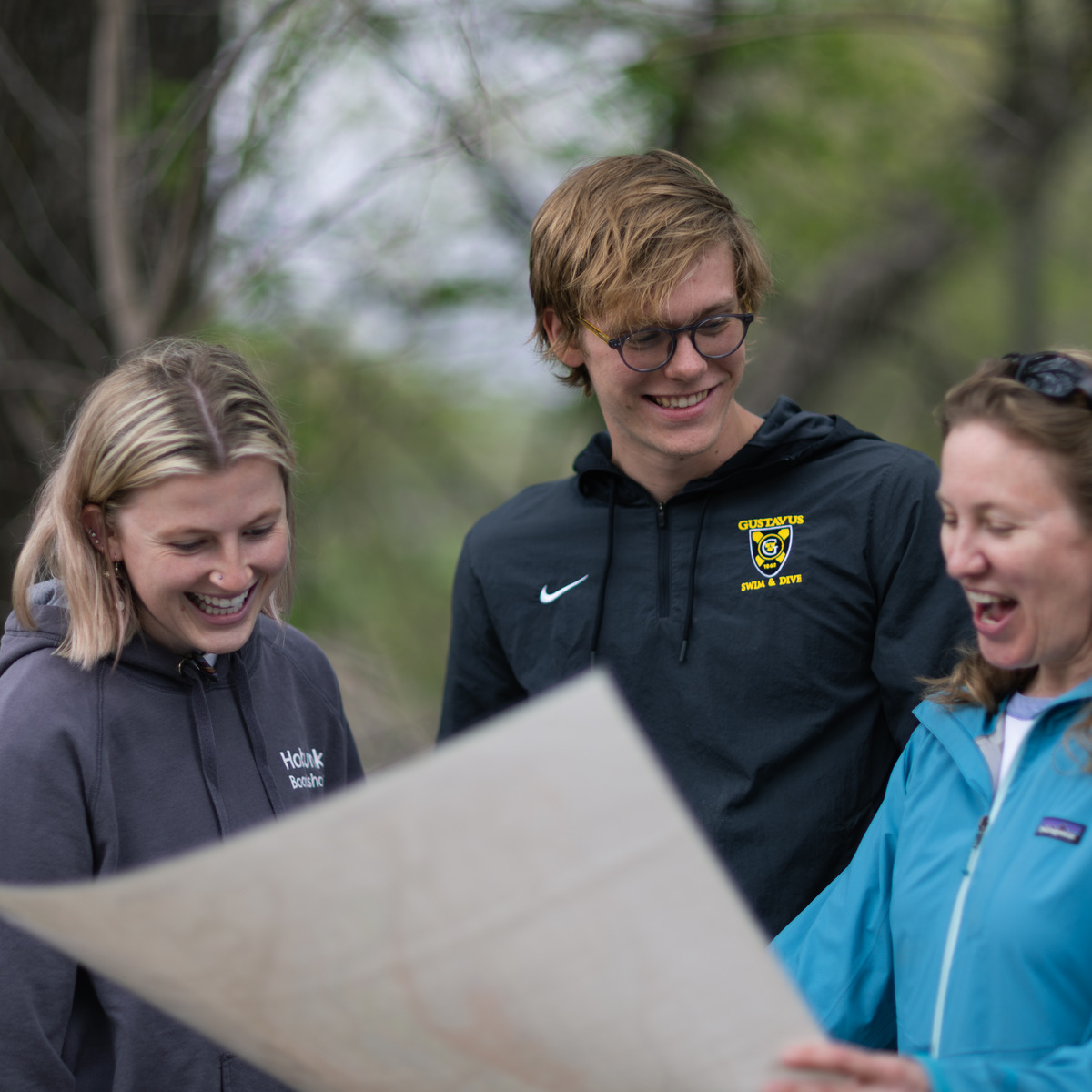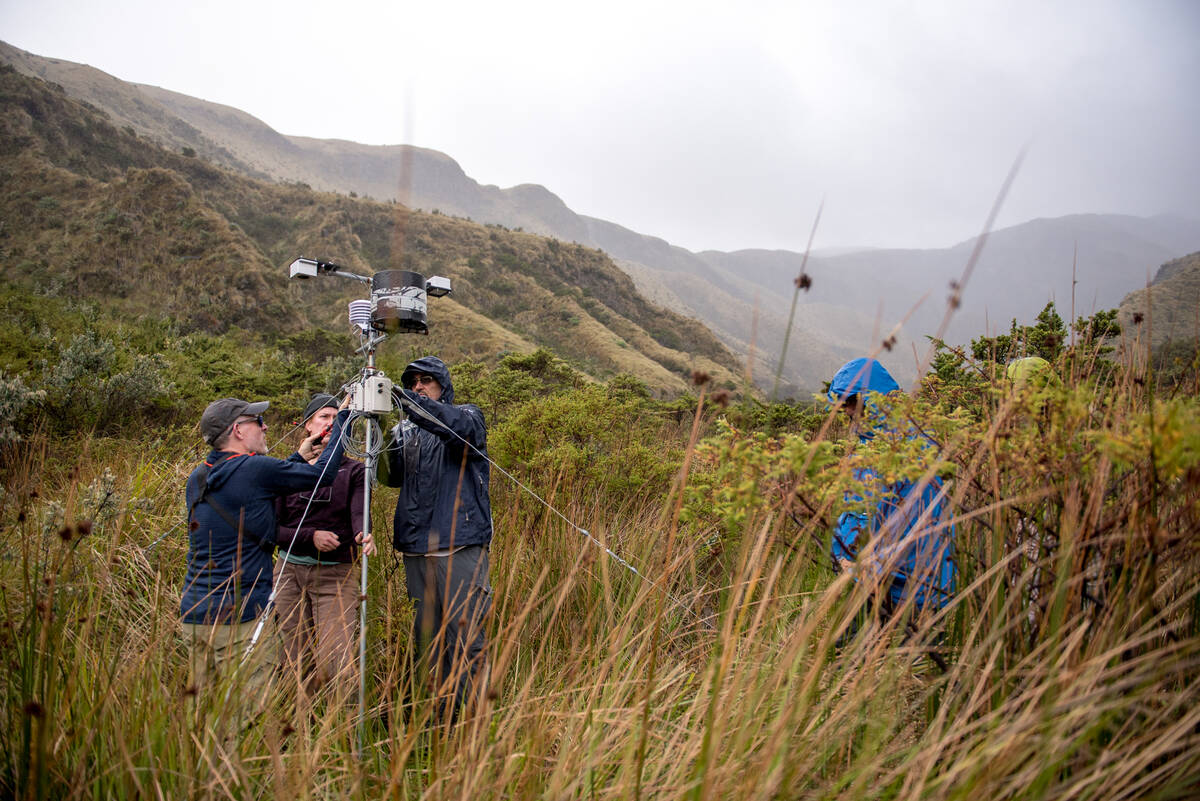Department of Environment, Geography, and Earth SciencesAcademics
About the Department
Investigating People and the Planet
The Department of Environment, Geography, and Earth Sciences (EGE) at Gustavus is a place to explore your passions and build tangible skills to make a meaningful impact. Our community of diverse learners draws on natural and social sciences as well as arts and humanities to understand the Earth's environments (past and present) and how humans transform and experience the world around us. We study earth science, social systems, and the links between the two. We tackle challenges such as climate change, sustainable natural resource use, and urban planning while prioritizing justice and equity. We use mapping and spatial analysis to study conservation and land use. With a variety of majors and minors to choose from, you can customize your education to fit your interests and goals. Working with dedicated faculty, students learn in collaborative, inclusive classrooms, and also while conducting environmental research and taking field trips.

Learning in Minnesota, Around the Country, and Around the World
As an Environment, Geography, and Earth Sciences student at Gustavus Adolphus, you'll join a top program in the state with a wide range of study options. Located in the beautiful State of Minnesota, Saint Peter is in the Minnesota River valley. The Gustavus Adolphus campus is a perfect place to build close-knit relationships with proximity to big-city opportunities, museums, and internship sites. You're minutes away from the medium-sized city of Mankato and an hour from the dynamic Twin Cities of Minneapolis and St. Paul. Further north, you'll find majestic Lake Superior and the Boundary Waters Wilderness Area. As a Gustie, you'll enjoy rewarding hands-on learning experiences on campus, around Minnesota, and beyond.
Request More info About Environment, Geography, and Earth Sciences
Discover your path:
Majors, Minors, and Related Programs
We unite the fields of Geography, Geology, and Environmental Studies into a single, interdisciplinary department to better understand our planetary home from a variety of perspectives. Students in the Department may pursue majors and minors in Environmental Studies (ES), Geography (GEG), or Geology (GEO), with opportunities to specialize in a track matching a student's interests.
As a part of the EGE community, you will be prepared to engage with some of the world's biggest challenges, such as responding to a rapidly changing climate, protecting ourselves from natural and human-created hazards, and building more just and equitable cities. How do we utilize energy and Earth's resources in an environmentally and socially sustainable way? How do various cultures view their relationship with the natural world, and how does that shape human cooperation and conflict? Come explore these and other big questions.
Related Programs

A Curious Community Exploring the World
Students and faculty in the Environment, Geography, and Earth Sciences Department enjoy experiential or "hands-on" learning. Field trips, research opportunities, study away, project-based learning, and laboratory experiences enrich learning and provide real-world training.
Opportunities in Environment, Geography, and Earth Sciences
EGE at Gustavus Extends Far Beyond the Classroom
As a student in EGE, you can apply your learning across campus and around the world. Recent opportunities have included participating in faculty-student research projects, helping implement a campus-wide composting program, creating and curating exhibits in the Geology Museum, and traveling to study glaciers in a unique collaboration between scientists and artists. Learn more about opportunities to grow in and out of the classrooms.
Explore all opportunities in Environment, Geography, and Earth Sciences
- Research — There are numerous opportunities to conduct research in the lab and the field using cutting-edge research equipment and facilities
- Field Trips — Students and faculty regularly embark on off-campus excursions
- Learning Facilities and Instrumentation — The newly renovated Nobel Hall of Science is home to the classrooms, labs, and equipment for advanced and comprehensive learning
- Study Away — Immerse yourself in another culture while also continuing with your academic studies
- Internships — An opportunity to apply academic learning in a professional setting that helps determine a career path
- Sustainability Interns — Provide significant leadership related to campus sustainability projects
- Student Community — There are regular activities to get to know the students and faculty in the department
- Student Awards — Student academic excellence in the classroom and research is annually honored
- The Arboretum — The 125-acre natural area on campus serves as an outdoor classroom and recreation space
- Careers and Graduate School — With support from the faculty and Career Development Center, you receive the resources you need, from first year through graduation

Gusties
will
Shine
Students and faculty in the Environment, Geography, and Earth Sciences Department are curious and innovative learners. Read more about the change-makers in our community. Graduates affect change in realms like science research, sustainability, community development, education, and more.

Dr. Jeff La Frenierre
"Researching Glacial Melt in the Ecuadorian Andes - Listen to the Learning for Life Podcast" Dr. Jeff La Frenierre of the Gustavus Environment, Geography, and Earth Sciences Department at Gustavus on his path to the discipline of Geography, how and why he decided to research glacial melt and its impact on people and communities, the process and challenges of conducting research outdoors...
Start your journey in Environment, Geography, and Earth Sciences
The EGE Department prepares you to address significant challenges at the local and global levels. When you become an EGE student, you're also becoming part of a vibrant campus-wide community. Our students are engaged in activities across campus, including clubs, fine arts, athletics, and more. A liberal arts education, combined with involvement on campus and beyond, prepares holistic graduates to lead in a complex world. You'll leave EGE ready for a rewarding career.
Contact Environment, Geography, and Earth Sciences
Email: EGEdeptinfo@gustavus.eduPhone: 507-933-7333
Nobel Hall of Science, 2145
800 West College Avenue
Saint Peter, MN 56082
